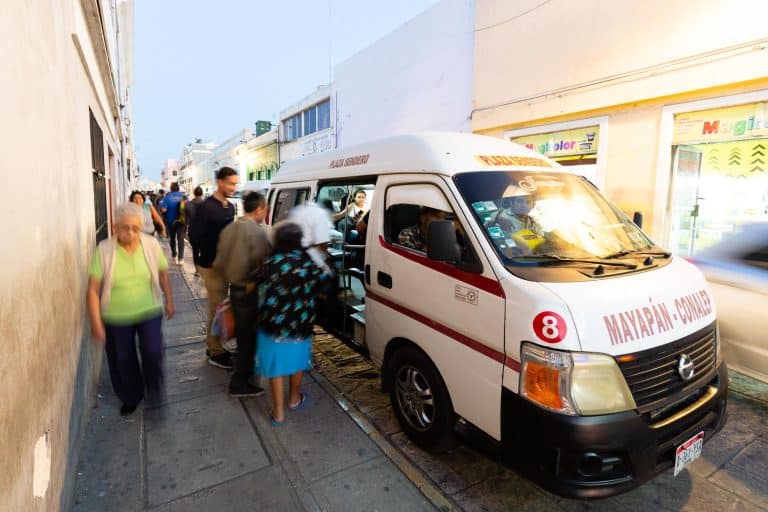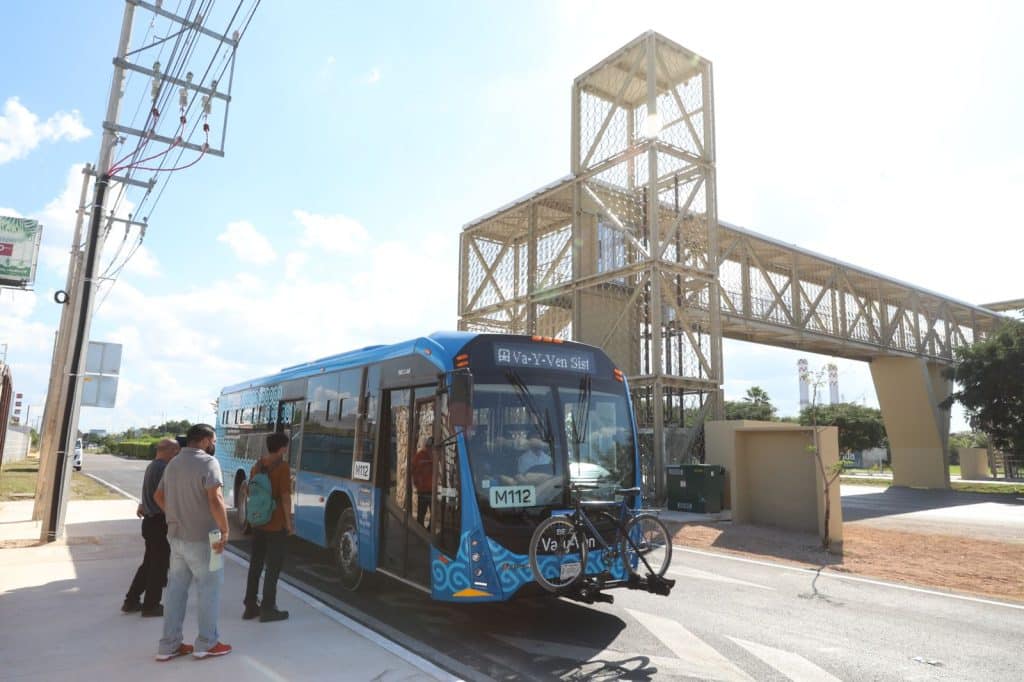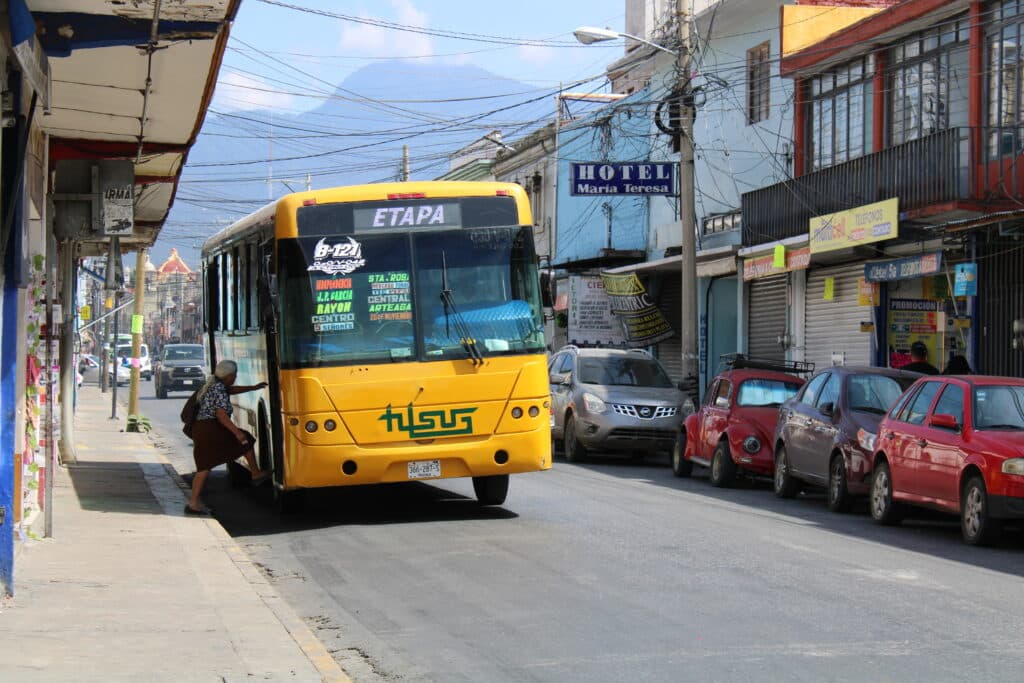
Public transport is a key component of building sustainable cities. Millions of people depend on it to access economic and educational opportunities as well as medical services, childcare and public spaces. An efficient, integrated, inclusive and safe public transport system has the potential to disincentivise the ever-growing use of private motorised vehicles. Public transportation improves the quality of life by easing congestion, reducing air pollution and contributing to combatting climate change.
In Mexico, the efforts to expand and improve public transport systems have been made at different government levels. However, much remains to be done in terms of efficiency, digitalisation, social inclusion, safety and sustainability, especially in medium-sized cities. So, what is a possible road towards more and better public transport systems in Mexico?
In 2022, under the Paris Agreement, Mexico updated its commitment to reduce its greenhouse gas (GHG) emissions by 35 %. This objective is important if we consider that Mexico is ranked twelfth among the countries with the highest GHG emissions [2]. The transport sector plays a relevant role in this, after the energy sector, transport is the second most polluting, with more than 20 % of GHG emissions at the national level [3].
One way of contributing to emission reduction is encouraging the use of public transport instead of individual motorised transport, such as cars. Nevertheless, there are several factors that make it difficult. As a daily commuter, you face problems of insecurity and lack of accessibility. At the decision-making level, there is a lack of viable financing options as well as technical capacities.
Currently, public transport is used by half of the population in Mexico. However, in recent years, 75 % of the investment in mobility has targeted infrastructure for cars [4]. Furthermore, during the COVID-19 pandemic passenger numbers dropped sharply leading to a significant revenue loss for operators. In consequence, the deficit has hampered much needed investments to maintain and improve public transport systems.
In Mexico, the level of mobility services is also an indicator of predominant social inequalities. Compared to those living in urban centres, people living far from cities spend 15 % more money on public transport and spend up to four hours more on their trips [5]. In addition, remote public transport facilities are unsafe. At least in the metropolitan area of Mexico Valley, 80 % of residents report feeling insecure on their journeys and women have more fear of becoming victims of crime, including sexual harassment [6]. This reduces mobility options for people and their access to labour and social opportunities.
The transport sector witnessed a significant cornerstone in 2022. The federal government approved the General Law of Mobility and Road Safety (LGMSV in Spanish), which guarantees safe and sustainable mobility as it is recognised for the first time in Mexico as a constitutional right. The LGMSV introduces a gender perspective and prioritises pedestrians and cyclists over other motorised means of transport.
The Deutsche Gesellschaft für Internationale Zusammenarbeit (GIZ) in Mexico supported the process of the LGMSV by participating in the national process of law harmonisation (2019-2022) as well as in the elaboration of the national implementation strategy (known as ENAMOV) (2022-2023). GIZ Mexico also provides technical services to entities to adopt their local mobility laws in accordance with these reforms. In addition, to create and implement intelligent, integrated, inclusive and sustainable transport systems, medium-sized cities require hands-on operational support.
Subnational governments need technical capacities and tools to visualise mobility needs and design corresponding solutions more easily as well as to take informed and evidence-based decisions. Also, there are problems of access and distribution of information. For example, decision makers do not have information on funding sources and plans to implement public transport projects. Likewise, there is a need for mechanisms to promote a systematic dissemination of innovations, technologies, experiences outside and within Mexico.

In collaboration with the Mexican government and allies from different sectors, GIZ Mexico implements measures to reduce the environmental impact of the transport sector. Projects aimed at freight transport and, more recently, at urban public transport.
As an example, the project “Transition towards a Sustainable, Integrated and Smart public transport in Mexico” (TranSIT) started in September 2022 on behalf of the German Federal Ministry for Economic Cooperation and Development (BMZ in German) with the objective to improve the quality and efficiency of public transport at national and subnational level.

To achieve this goal, from 2022 to 2026, the GIZ in Mexico works with the Secretariat for Agrarian, Territorial and Urban Development (SEDATU), the states of Oaxaca, Yucatán, Puebla (recently the project was extended to Mexico State) and the municipality of Leon (in Guanajuato State) as well as with local key organisations in the sector.
Through this collaboration, GIZ in Mexico is developing tools to improve decision-making processes; implementing smart, inclusive and climate-friendly public transport demonstration projects in selected regions; strengthening the technical capacities of decision makers; and it will seek to promote the exchange of knowledge and lessons learned among key players in the sector.
[1] Mexican Institute of Competitivity. (IMCO), “Índice de Movilidad Urbana: Barrios mejor conectados para ciudades más equitativas”, retrieved on October 17, 2022.
Transition Towards an Integrated, Accessible and Smart Public Transport System in Mexico (TranSIT) is funded by the German Federal Ministry for Economic Cooperation and Development (BMZ). It supports the development and implementation of efficient, inclusive and intelligent public transport solutions, working closely with the mobility and transport authorities, the private sector, NGOs, civil society, and academia on state and subnational level.
You are currently viewing a placeholder content from X. To access the actual content, click the button below. Please note that doing so will share data with third-party providers.
More Information